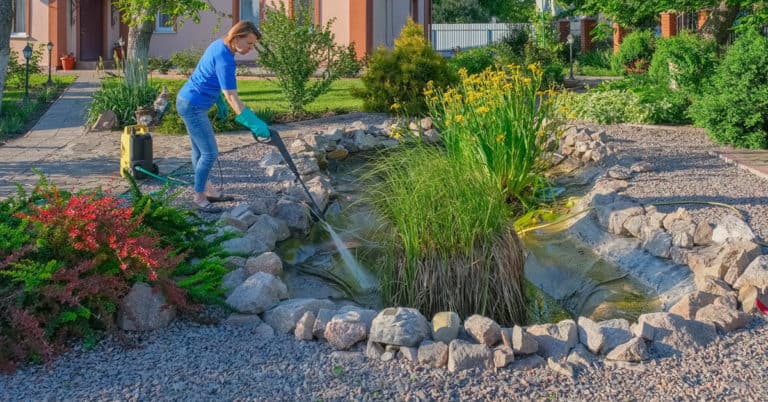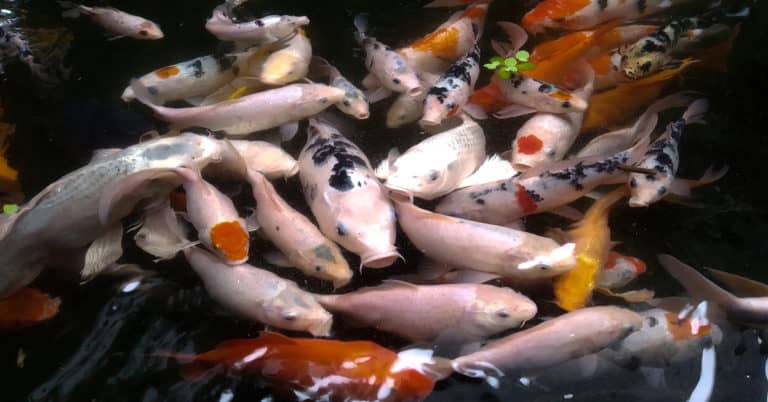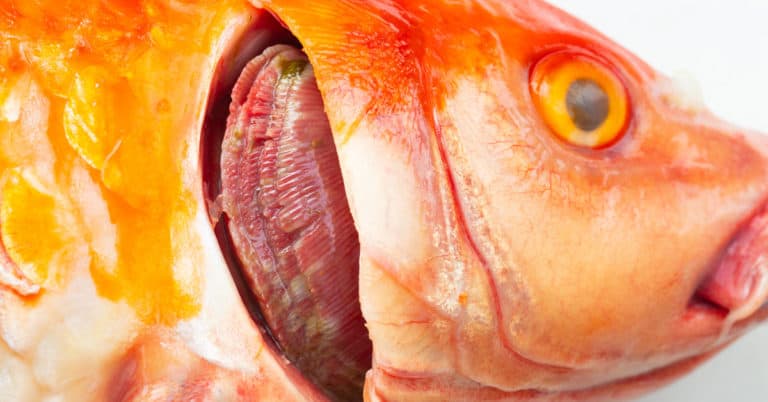The great blue heron is a gorgeous, graceful bird that is fascinating to watch from a distance. But when this koi predator is looking for a snack in your backyard pond, it’s not quite as enticing. Because the United States Migratory Bird Treaty Act protects herons, your methods of heron deterrent must be humane.
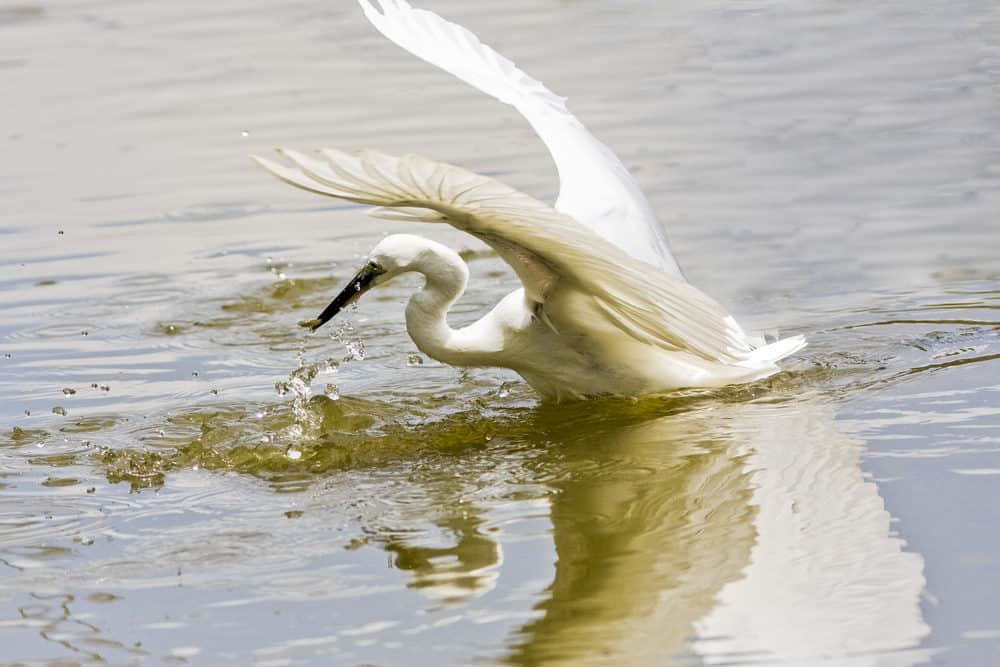
I’m a pond hobbyist with a backyard fish pond of my own. I understand the risk of herons eating your beautiful, beloved, and expensive koi fish. In most parts of the United States, they're the biggest threat to your koi fish - even more so than racoons, mink and turtles. I’ve done extensive research to find the most effective-and compassionate-way to keep herons out of koi ponds.
Your pond and the fish that populate it are an investment, and it’s not fair that herons can quickly rob you blind. Learn how to keep herons out of your koi pond using methods like:
The great blue heron is most often found around the coast, especially Florida, but they’re attracted to any body of water. Herons that live in cold regions often migrate in winter, unless they have access to food supply during those months.
On top of the great blue heron, the gray heron is now found in the United States. This bird was native to Eurasia and Africa but has expanded its range, so keep your eyes open for both species.
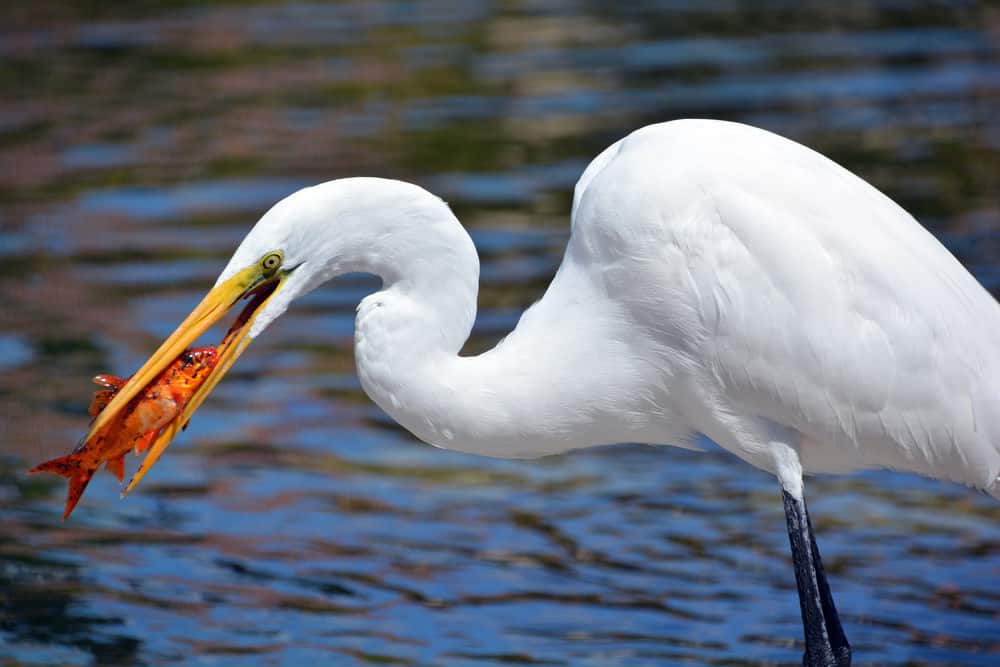
Herons mostly eat small fish, but they’ll eat other aquatic creatures if that’s all that’s available. Though they breed and roost in colonies, they’re solitary hunters so you’ll most likely only see one at a time in your yard.
They are creatures of habit, so if you spot a heron in your yard once, you can bet it’ll come back until you protect your koi fish pond from its attacks. If you see a heron flying overhead, it’s most likely scoping out your yard, so protect your fish while you can.
If you’ve ever seen a heron, you’re aware of how patient and graceful they are. This is because they spend most of their time stalking prey. They stand very still in one spot, lulling fish into a false sense of security before snatching them up.
Herons’ eyes have five times as many rods as human eyes, making them excellent hunters even in the dark. If you never see a heron around your pond but have noticed missing fish, the birds are most likely coming at night and hunting without leaving a trace.
Herons are large birds with long legs, so they can feed from deeper waters. Therefore, expanding your pool to have a deeper reach won’t deter herons. Changing the slope of your pond can prevent the birds from getting a firm grip, though. If you have a steep decline into the water, herons might slip and be too scared to return.
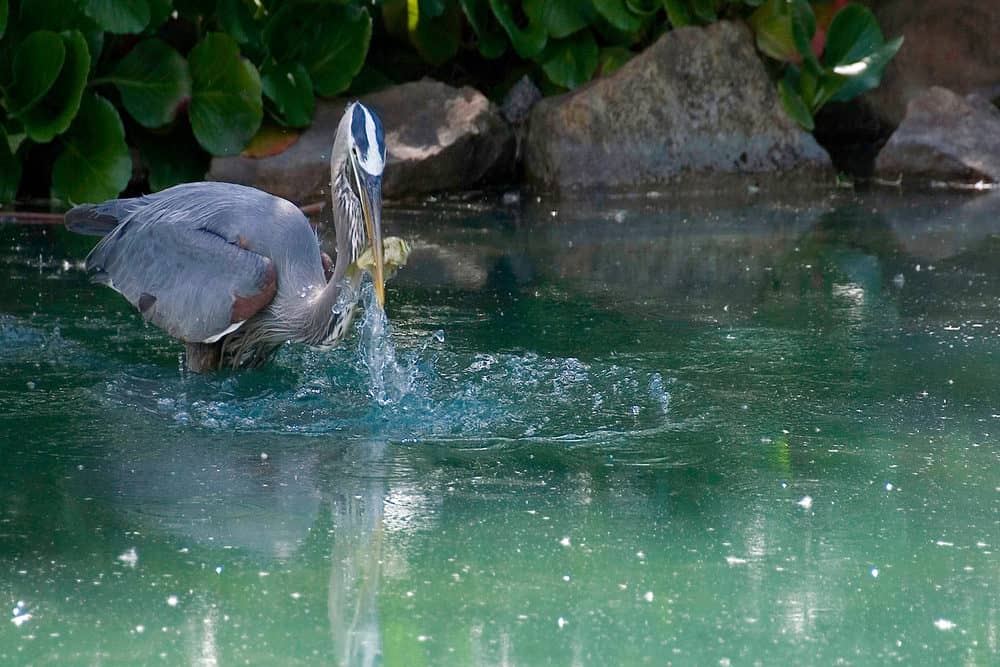
They usually feed at night or in the early morning, eating as much as a pound of fish a day. Even if you don’t see herons around your pond in daylight or at dusk, you can look for signs around the yard. You might notice some uprooted plants or heron droppings scattered on your grass.
You can also observe your fish for clues. Besides missing fish, you might notice that the remaining koi are skittish. They hide even during feeding time because they’re wary of predators.
Fish jump out of water sometimes, but it’s usually if the water conditions aren’t right or if they’re new to your pond. Finding established fish out of the water might be a sign that a pond predator visits at night.
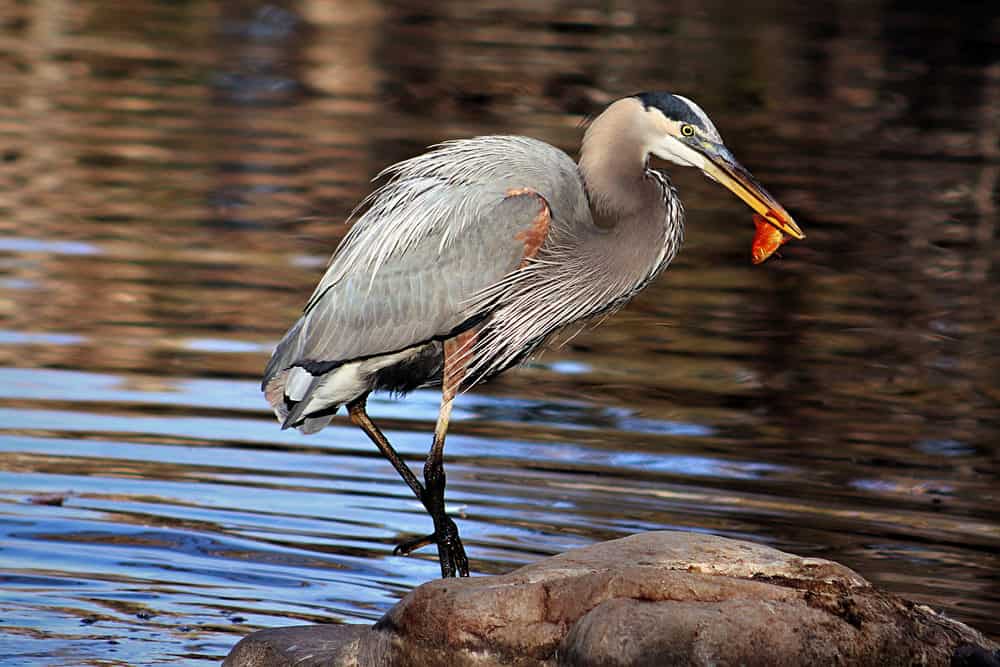
They might have gotten scared away and left their food behind. Check the fish for puncture wounds to see if a heron’s strong beak snapped them up and then dropped them.
If you find wounded fish, quarantine them as you nurse them back to health. Open wounds can make them more susceptible to disease, so it’s best to keep them in a separate tank for at least 30 days. Make sure they seem strong before you put them back in the pond.
While you’re taking care of any wounded fish, make time to protect your backyard pond from future heron attacks.
Deterring herons keeps your yard and pond clean. Their droppings contaminate ponds and can kill your grass and plants. Also, as a pond owner, it’s your job to get rid of herons so your koi and other pond fish stay safe.
Herons love ponds because it’s so easy for them to grab the koi fish. If you restrict their access to your koi, then they’ll stop coming to your yard.
Pond netting is the easiest way to do this. Stretch the net across your pond to prevent herons and other predators from wading into the water.
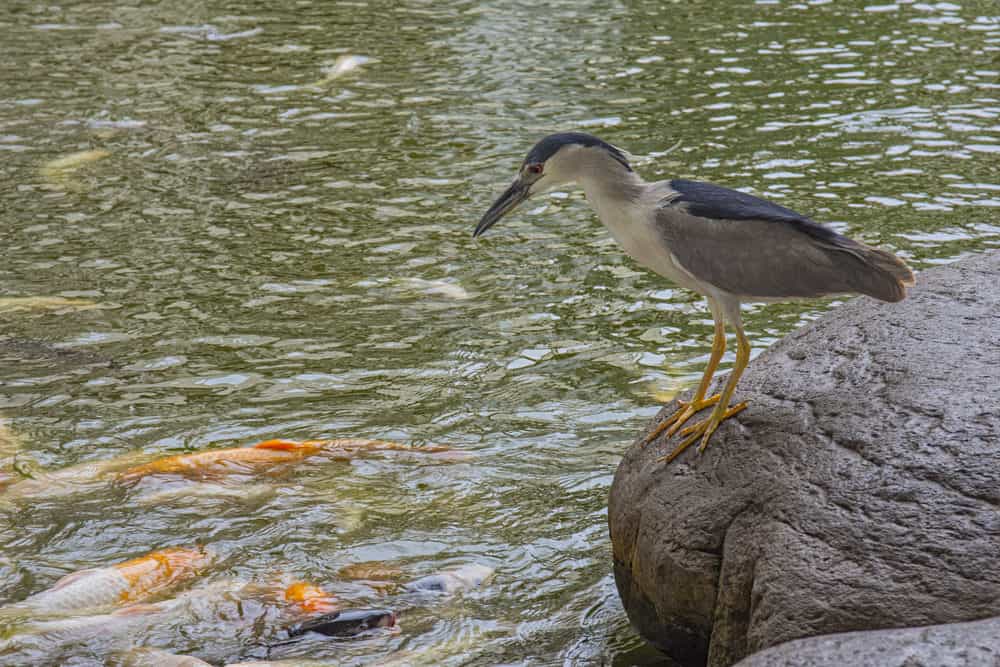
You can find pond netting in different sizes and colors. Even if you get a dark net that blends in with your water, you might not like the look of it. In that case, you might prefer to use a clear fishing line. Zig zag the fishing line across the surface of your pond, tethering it to nearby trees or stakes.
Because it’s clear, the fishing line won’t detract from the beauty of your pond. And herons will have a hard time seeing it, so they’ll struggle to reach your fish before giving up.
Herons come to your koi pond because they can see a tasty meal from far away. To keep herons out of koi pond, you can decrease your pond’s visibility to help hide your fish.
Growing pond plants is a great way to provide pond coverage. The floating plants can help regulate the water temperature. They provide shade and hiding places for your fish. Since they block sunlight, they can prevent algae from growing out of control.
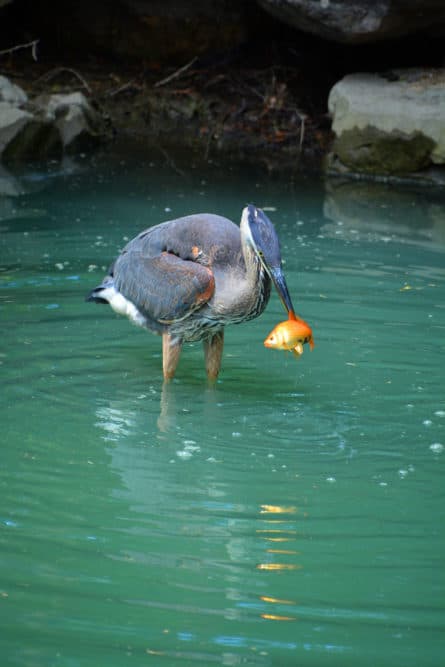
You can also use pond dye to darken the water. This substance is safe for fish, but tints the water and helps block sunlight.
An aerator is another way to obstruct the surface of your pond. You can put them on a timer so they run overnight or when you’re away. The water will bubble and make it hard for a heron to see what’s living in the pond.
Because your pond is small when compared to a heron’s usual hunting grounds of marshes and lakes, your koi fish are easy targets. The fish have a limited amount of space, so you can give them hiding places to keep them out of the heron’s sight and reach.
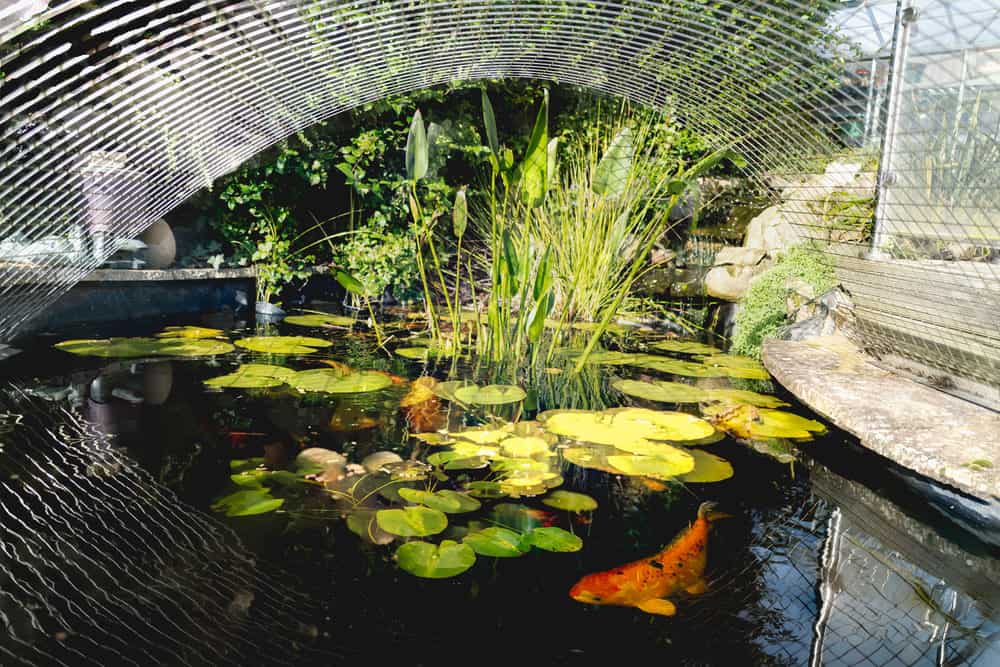
If you’re building a new pond or expanding what you have now, you can build tunnels into the sides and bottom of the area. Otherwise, you can buy fish caves. These are hard plastic tunnels that you put at the bottom of the pond. Fish can hide inside of them until the heron leaves.
Decoys come in several varieties: fish and other predators, alligator decoy, owl decoy, heron decoy, and other predator decoy herons can't stand.
There are many different decoys on the market you can use in and around your pond. You can get decoys of predators that are larger than herons and place them near the water so the herons don’t even approach.
You can use birds as well, like an owl decoy. If you use an animal decoy, move it around the area periodically. Herons have great eyesight and will realize the decoy is just a statue if it’s always in the same place.
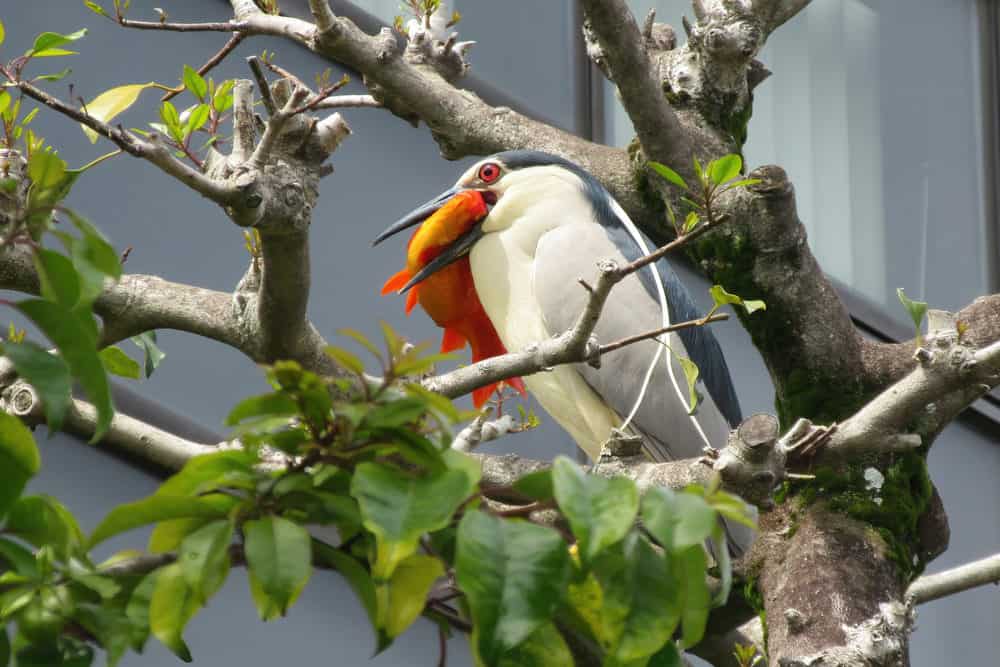
Some people suggest using a heron decoy because herons are solitary and territorial. This can work to your advantage most of the time, but during mating season you might actually attract more grey herons or great blue herons to your pond!
An alligator decoy is one of the best options because it’s larger than the heron and can float in your pond. A heron might not notice it and will swoop down before getting scared off by the massive predator lurking in the water.
Koi fish decoys are another great idea. It might sound strange to have fake fish floating in your pond, but think about it: a heron sees fish swimming in your pond. It lands and wades into the pond, giving your koi time to hide in the fish caves and tunnels. When the heron reaches in to snag a fish, they grab a decoy! It’s the perfect foil.
Since government legislation protects herons, you can’t harm them, but you can scare them. There are motion-activated machines that will startle herons using sounds or lights and make it easy to keep herons out of koi ponds.
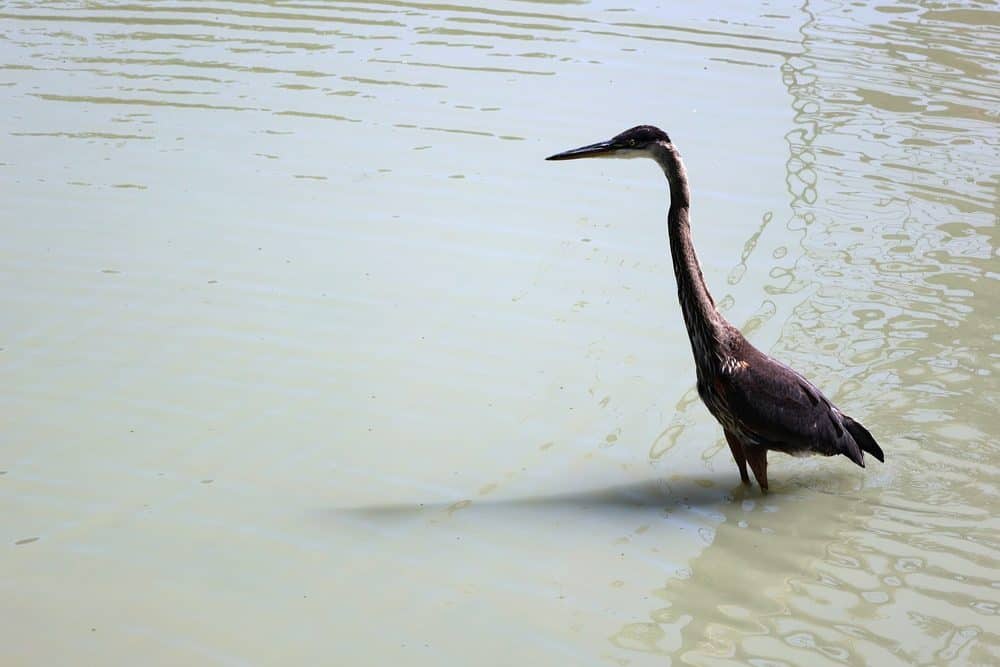
Sounds will scare herons no matter what, so some pond owners recommend playing talk radio or a podcast at a low volume on an outdoor speaker system. The heron will recognize human voices and stay away. You can also use wind chimes because they make noise sporadically.
If you don’t want to waste electricity on motion-sensor lights, you can place mirrors at random angles around the pond. The mirrors will reflect light from the moon, stars, surrounding lights, and the pond’s surface. Seeing light will startle the predatory bird and they’ll move on.

